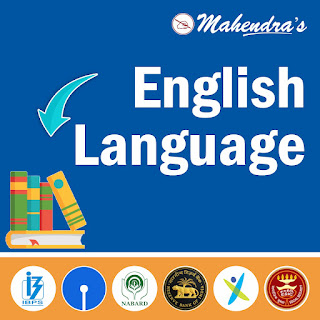Dear Readers,
Mahendras has started special quizzes for BPS | RBI | SBI | NABARD | ESIC | SIDBI so that you can practice more and more to crack the examination. This BPS | RBI | SBI | NABARD | ESIC| SIDBI NABARD Exam special quiz series will mold your preparations in the right direction and the regular practice of these quizzes will be really very helpful in scoring good marks in the Examination. Here we are providing you the important question of English Language for the BPS | RBI | SBI | NABARD | ESIC| SIDBI .
A. Beyond that, science is yet to figure out what causes the pancreas to fail in its task of creating insulin cells.
B. While figures suggest that India is in the grip of a Type 2 diabetes epidemic, with more rural than urban populations diagnosed with the condition, there is also a marked rise in Type 1 afflictions.
C. Finding the cellular mechanisms behind the development of autoimmune diseases, such as Type 1 diabetes, could lead to treatments that help us lead longer, healthier lives
D. Among the two most common variants of diabetes mellitus — the condition in which the blood contains unhealthy levels of glucose — Type 1 diabetes is the most mysterious.
E. Type 1 diabetes is believed to be congenital and affects children and young people unlike Type 2, a late onset disease that afflicts 90 per cent of diabetics and is thought to be caused by improper nutrition and other lifestyle factors.
F. Around the world, 21 million people have Type 1 diabetes and constitute between 5-10 per cent of global cases of diabetes.
G. In this condition the cells that produce insulin, the hormone necessary to control sugar, are either too few or non-existent and the only solution is to ingest insulin externally.
Q1 Which of the following should be the ‘ SECOND’ statement?
01. D
02. E
03. A
04. B
05. G
Q2 Which of the following should be the ‘SIXTH’ statement?
01. A
02. E
03. C
04. B
05. F
Q3 Which of the following should be the ‘ FOURTH’ statement?
01. B
02. E
03. C
04. F
05. A
Q4 Which of the following should be the ‘ LAST’ statement?
01. C
02. D
03. A
04. E
05. B
Q5 Which of the following should be the ‘ THIRD’ statement?
01. C
02. D
03. A
04. G
05. E
Q6-10 In the following passage there are blanks each of which has been numbered. These numbers are given below the passage and against each five words have been suggested, one of which fits the blanks appropriately. Find out the appropriate word in each case.
With the second round of 13 cities making it to the Centre’s list, there are now 33 urban agglomerations that have made a successful bid to become “smart cities”. The idea of city managers accepting a ‘challenge’ to make specific ‘smart’ proposals is being followed in several countries at different levels of development. Cities in the developed world are (A) on self-driving cars, electric vehicles and smart grids, while those in India are yet to meaningfully address basic issues such as walkability, public transport, waste management and pollution. This was evident in the latest round, for instance, with the Lucknow municipal administration, which made the best-rated bid, finding that C per cent of residents who took part in its online survey cited traffic and transport as their top priority, with 24 per cent highlighting solid waste management.(B) , this is also representative of the national story. City administrations have done a poor job of gathering data available from multiple sources and analysing them to make informed decisions on civic services. A lot of new information about what people do is now available from commercial services that use mobile phone applications, such as taxi companies, and the anonymised data with them can aid planning.
Cities that have successfully bid for Central seed funding face the real challenge of attracting private partners to raise the massive resources needed. The 20 cities chosen in the first round are expected to spend Rs.48,0H crore on projects, and the 13 in the second round, Rs.30,229 crore. Intelligent parking could be one way to (C) funds and cut congestion. By integrating IT, motorists could be guided to available parking spaces in various locations in a city, using real-time information. Over time, it would be possible to even predict the availability of parking spaces based on usage patterns. A smart city should look at robust IT connectivity and digitalisation. At the consumer end, however, few cities have (D) this. They have not integrated the databases of their service agencies for water, transport, property and energy, and are therefore unable to serve citizens online. This is the low-hanging fruit of civic smartness waiting to be picked, and it should be mandatory for all million-population cities to do so in a time-bound manner. The benefit of investment in urban regions is bound to increase property values, and governments should tap into the (E) to fund more programmes, especially affordable housing. All cities can become smart, if the Urban Development Ministry makes available off-the-shelf open source technology solutions for management. In the smart world, sharing rules. And governments should set the pace.
Q6 Choose the correct option for (A)
01. disarray
02. focussed
03. sharpen
04. concentrating
05. coverage
Q7 Choose the correct option for (B)
01. unsurprisingly
02. tranquility
03. alarming
04. excitedly
05. nervously
Q8 Choose the correct option for (C)
01. assembly
02. march
03. disperse
04. halt
05. mobilize
Q9 Choose the correct option for (D)
01. pondered
02. achieved
03. gained
04. negotiated
05. commence
Q10 Choose the correct option for (E)
01. surplus
02. lacking
03. spare
04. supernumerous
05. additional
Answers:-
Q.1 (5)
Q.2 (4)
Q.3 (2)
Q.4 (1)
Q.5 (3)
Q.6 (2)
Q.7 (1)
Q.8 (5)
Q.9 (2)
Q.10 (1)






0 comments:
Post a Comment
MAHENDRA GURU